Whether you desire a religious vocation or are interested in work outside the church, an online theology degree could provide solid preparation for your future.

In addition to engaging in an academic study of your faith and beliefs, you can also develop your research, writing, and critical-thinking skills. Along the way, you can even learn more about yourself and the people around you.
Editorial Listing ShortCode:
To learn more about the many benefits of an online bachelor’s degree in theology, let’s take a look at the courses, concentrations, and job opportunities that may come with this field of study.
Online Theology Degrees

Theology is the study of God and the divine. In this program, you can examine sacred writings and explore religious beliefs, practices, and doctrines.
There are many branches of theology that you can study during your bachelor’s degree program. Depending on your religious tradition, these branches may include:
- Bibliology: The study of the Bible
- Christology: The study of Christ
- Ecclesiology: The study of the church
- Eschatology: The study of the end times
- Hamartiology: The study of sin
- Soteriology: The study of salvation
In addition to exploring these topics, you can also learn about the history and development of theological teachings. Other courses might address apologetics, hermeneutics, teaching methods, ethics, religious rites, and research.
Editorial Listing ShortCode:
Some theology students add a degree concentration to their studies. Colleges can offer concentration options like philosophy, Christian education, New Testament, or local church leadership. For some, studying theology could be a first step toward a ministry career. With online pastoral degrees, you can learn truths about God and faith that you can then apply in a church setting.
Other theology graduates pursue career paths in nonprofit management, journalism, and writing. Earning a bachelor’s degree in theology may be only the first step in your educational journey. Some students go on to pursue a related masters or doctorate. Doctorate students may qualify you for academic careers, such as teaching religion in a postsecondary institution.
Common Online Bachelor of Theology Concentrations

If you’re interested in a particular area of this field, you can often choose to pursue a concentration for your religion and theology degree. Here are some theology concentration options that some schools offer:
- Apologetics. In addition to studying theological doctrines, you can learn how to support and defend those beliefs. These skills can help you strengthen believers’ faith or provide a response to those who don’t share your religious views.
- Biblical Studies. For this program, you can take courses on the Old and New Testament and the various literary styles in the Bible. Some courses might involve in-depth study of specific Bible books or authors.
- Ethical Studies. As a student of ethics, you can discuss morals and values from a religious perspective. Your studies might focus on issues like social justice or environmental values.
- Philosophy. In addition to studying doctrine and sacred writings, you can also learn about major philosophers and their ideas related to epistemology and ontology. You might discuss how to apply philosophical ideas to modern issues in politics or society.
- Religious Education. To equip you for teaching children or adults about matters of faith and doctrine, you may take classes on learning theories, classroom methods, and special needs. Some programs with a student teaching component prepare you for state licensure.
Your college may have a lineup of concentrations that includes focus areas other than these.
Theology and Religion Careers & Salaries
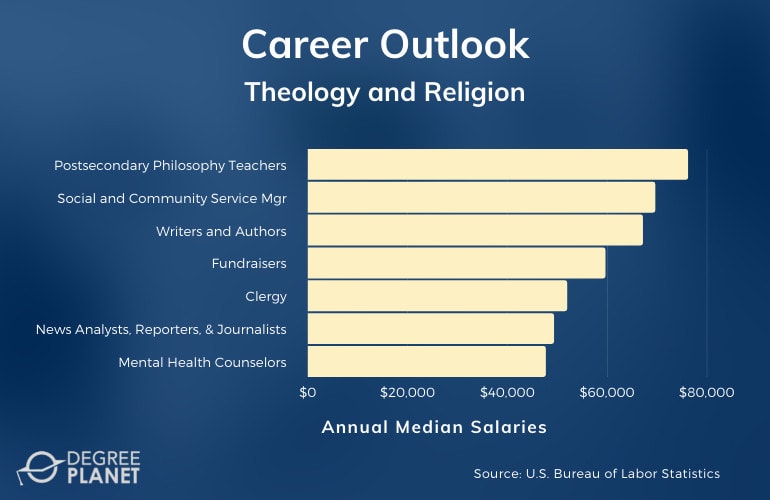
Theology majors often choose this degree program because they’re interested in a career that helps bring others closer to God. For many, that means working in a local congregation or a parachurch ministry.
Clergy members lead churches in worship and teaching. They may plan services, administer sacraments, and guide congregations’ doctrinal stances. In some denominations, ordination is required for clergy members. Local ministers may eventually advance within a denomination and move into higher leadership roles.
Congregations can hire other religious professionals as well. For example, some theology graduates might become activities directors or religious education coordinators. Others could oversee music, library services, outreach, or volunteerism.
According to the Bureau of Labor Statistics, the median annual salary for jobs in community and social service is $47,520.
| Careers | Annual Median Salaries |
| Postsecondary Philosophy and Religion Teachers | $76,160 |
| Social and Community Service Managers | $69,600 |
| Writers and Authors | $67,120 |
| Fundraisers | $59,610 |
| Clergy | $51,940 |
| News Analysts, Reporters, and Journalists | $49,300 |
| Substance Abuse, Behavioral Disorder, and Mental Health Counselors | $47,660 |
| Community and Social Service Specialists | $46,770 |
| Religious Activities and Education Directors | $45,110 |
| Religious Workers | $33,530 |
In some cases, the rules of your denomination determine which church-related job opportunities are available to you with a bachelor’s degree. Some theology graduates become writers or communicators. They might pen books or articles.
Editorial Listing ShortCode:
Others pursue roles in community service as counselors, social service specialists, fundraisers, or program managers. Additional licensure may be needed, especially for many counseling positions. Those with graduate degrees in theology may also qualify for an academic career at a college.
Theology Bachelor’s Curriculum & Courses

Typically 120 credit hours in length, your BA in Theology online program may include courses like the ones listed below.
- Bible Study and Interpretation: This class will be dedicated to hermeneutics, which is a branch of study focused on how to read and understand the Bible.
- Christology: This branch of theology, which is the study of Christ, may cover Old Testament types and prophecies of the Messiah and also examine the life and role of Jesus Christ.
- Church Sacraments: This course may be geared toward your school’s denominational affiliation, and it could cover sacraments like baptism, communion, and ordination.
- Ethics and Morality: A Christian ethics class may cover theoretical ideas about morality as well as practical encouragement to live a life of integrity.
- Hamartiology: During a course on the theology of sin, you’ll study what various Christian traditions have taught about wrongdoing and evil, and you’ll explore the concepts of forgiveness, atonement, and judgment.
- History of the Church: In one or more classes, you’ll learn about the development of the church, from the days of Acts through modern times.
- Introduction to the Bible: One of your first theology classes may introduce you to the overall structure and design of the Bible, providing introductory tools for reading and understanding the scriptures.
- Systematic Theology: You may have one or more classes that go over the major theological doctrines of the Christian Church and the specific viewpoints of various denominations.
- Theological Research: This class teaches you to conduct scholarly research on theological topics.
- Trinitarian Theology: In this course, you’ll study historical and modern interpretations of the Christian doctrines of the Father, the Son, and the Holy Spirit.
While many theology degree programs are run by Christian universities, you may also have theology degree options at schools founded on other religious traditions.
Admissions Requirements

While the admissions process varies from one school to the next, common application requirements include:
- Essay or personal statement
- References from spiritual mentors, work supervisors, or teachers
- Scores from the ACT or the SAT (not required at all schools)
- Transcripts from high school and any college courses
When applying to colleges, it’s strategic to pay close attention to deadlines and to do your best to submit all documentation well ahead of the cutoff dates.
Online Theology Programs Accreditation

It’s beneficial to invest your time and money in regionally accredited studies. The most reputable schools in the US hold regional accreditation. This designation is recognized by the majority of religious and secular colleges throughout the country.
Editorial Listing ShortCode:
Regional accreditation plays a critical role in several situations. For one thing, accredited coursework may be transferrable to other regionally accredited colleges. Qualifying for grad school can also require an accredited bachelor’s degree. In addition, some employers only hire applicants who have graduated from accredited institutions.
Financial Aid and Scholarships

At many schools, most students receive some form of financial aid. Compiling a financial assistance package can help reduce the amount of upfront tuition that you’ll owe to your college.
Applying for financial aid usually begins with filling out the Free Application for Federal Student Aid (FAFSA). The information on this form determines whether you qualify for grants, loans, or other assistance from your state or the federal government.
Your FAFSA can also influence whether you receive financial aid from your college. Many schools distribute merit- or need-based institutional aid as one-time or renewable scholarships. Other organizations—such as churches, denominations, community organizations, or businesses—may offer scholarships, too. Some scholarships are also specifically available for students studying theology.
What Is the Study of Theology?

The study of theology explores the nature of God and matters of faith. You can study religious texts and doctrines to better understand beliefs about God, humanity, the natural world, and the spiritual realm. Other topics covered in systematic theology can include sin, death, suffering, salvation, forgiveness, and miracles.
Theological studies are often rooted in a particular faith tradition, so it’s common for students to select a school that aligns with their religion or denomination. A college’s religious tradition can shape the curriculum that is included in the theology program.
Why Study Theology?
Earning a degree in theology can be personally satisfying. As you study doctrines and read holy texts, you may grow in your faith and knowledge of the divine. Going to school for a theology degree can be a time of personal growth, and you can also cultivate skills in research, writing, and debate.
Beyond that, a theology degree can also have a lifelong influence on your career trajectory. Some students who study theology are interested in how to become a preacher. As a theology graduate, you may find it fulfilling to serve other people in a local church, a nonprofit organization, or another setting.
What Can I Do with a Theology Degree?

Theology graduates commonly teach theological concepts to others. That’s often done in local religious congregations. Careers related to theological studies can include minister, religious education director, and religious activities coordinator.
Some theology graduates choose to serve in nonprofit organizations. They might work as program managers, community service specialists, fundraisers, or other personnel in religious or community agencies. According to the Bureau of Labor Statistics, social and community service managers earn between $42,230 and $115,800 annually.
Some theology students become writers. They might author books about theological topics or report on religion news for a magazine or a newspaper.
How Long Does It Take to Get a Bachelor in Theology Online?

Undertaking theological studies online may be a 3 to 4 year process. Many online programs follow a traditional semester format, just like on-campus programs do. With that arrangement, a full-time bachelor’s degree usually takes 4 years to complete.
Other online programs offer shorter class terms that run year-round. This may be called an accelerated or fast-track schedule. With such an arrangement, you may be able to shave several months off the traditional timeframe of a bachelor’s degree if you attend full-time.
Editorial Listing ShortCode:
Due to the depth of theology studies, though, it’s not uncommon for theology students to need a full 4 years to complete their degree.
What’s the Difference Between an Online Degree in Theology vs. Philosophy?
Theology is a rather philosophical field, but it’s not the same as philosophy.
| Theology Degree | Philosophy Degree |
|
|
Both philosophy and theology degree programs can equip you with soft skills that are needed in many industries.
What’s the Difference Between Religious Studies vs. Theology Bachelor Degree?
For your religion-focused education, you may wonder whether religious studies or theology would be the better program for you.
| Theology Degree | Religious Studies Degree |
|
|
After earning either degree, you can choose to expand your career opportunities with a graduate degree.
What’s the Difference Between Divinity vs. Theology Major?
At a school that offers religious education, there may be both a theology department and a divinity department.
| Theology Degree | Divinity Degree |
|
|
These two programs may share many of the same courses.
Is a Bachelor’s Degree in Theology Worth It?

Yes, a bachelor’s degree in theology is worth it for many students. If faith and religion are some of your most important values, then online theological degrees can help you put your values into practice. Many find careers in ministry or theological leadership deeply fulfilling.
Editorial Listing ShortCode:
There may be growth potential for jobs in this field, too, especially if you want to work in a community organization. Overall, the Bureau of Labor Statistics predicts a 12% growth rate for community and social service jobs over the next decade. For social and community service managers, a 15% growth rate is expected.
Universities Offering Online Bachelors in Theology Degree Programs
Methodology: The following school list is in alphabetical order. To be included, a college or university must be regionally accredited and offer degree programs online or in a hybrid format.
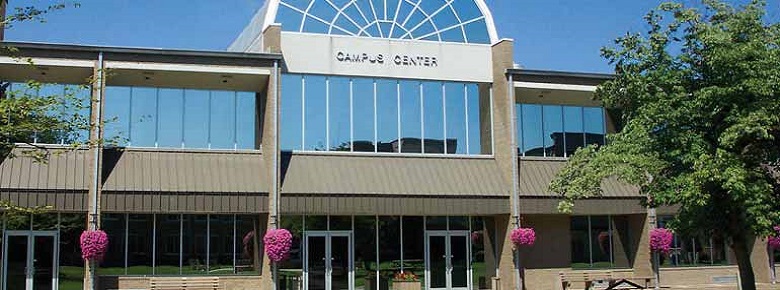
Brescia University offers a Bachelor of Arts in Theology with an emphasis in Pastoral Studies. Students must complete 128 credit hours to graduate. To be eligible for the program, applicants must submit an online application with copies of their official high school transcripts or GED certificates. ACT or SAT test scores are not required but encouraged by the program.
Brescia University is accredited by the Southern Association of Colleges and Schools Commission on Colleges.
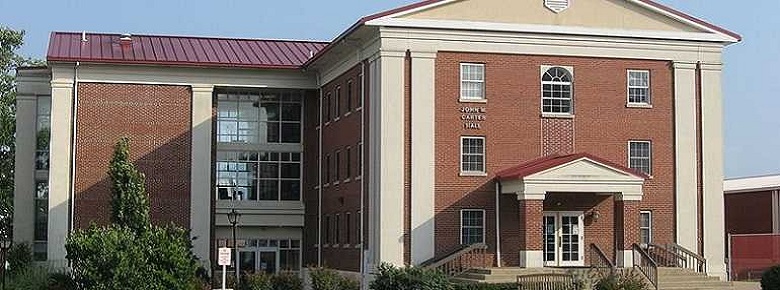
Campbellsville University offers a Bachelor of Science in Pastoral Ministries. To graduate, students must complete 120 credit hours. Each course is 8 weeks long, and the program can typically be completed in 4 years. Applicants must submit an online application with official transcripts from any schools attended.
Campbellsville University is accredited by the Southern Association of Colleges and Schools Commission on Colleges.

Clarks Summit University offers an online program for a Bachelor of Science in Bible and Theology. Students must complete 121 credit hours to graduate. Students may dual-enroll with the Baptist Bible Seminary master’s program. Those interested in the program may talk to a CSU Counselor before submitting an online application.
Clarks Summit University is accredited by The Commissions on Higher Education of the Middle States Association of Colleges and Schools.
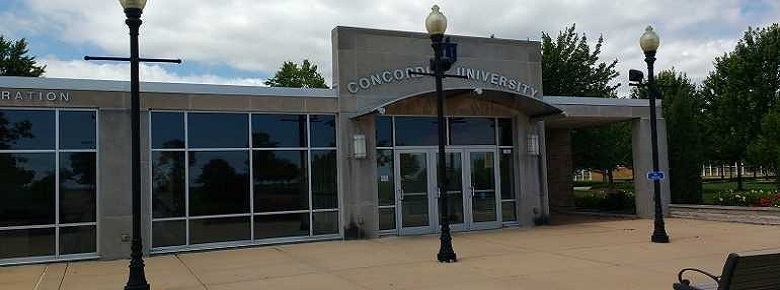
Concordia University—Wisconsin offers a Bachelor of Arts in Theological Studies. The program is designed to allow students to complete a minor while pursuing their major.
To graduate, students must complete 128 credit hours. Applicants must submit an online application with official transcripts from either their high school or a post-secondary institution at which 60 credits were obtained.
Concordia University – Wisconsin is accredited by the Higher Learning Commission.
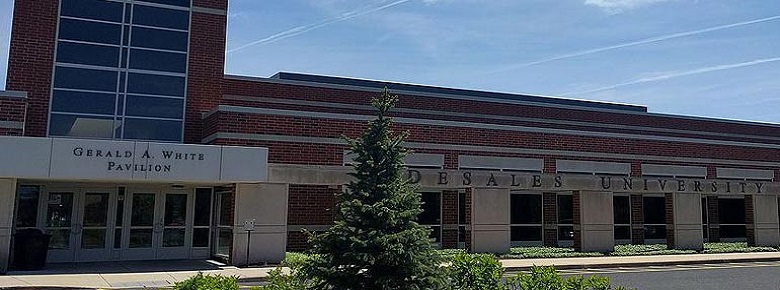
DeSales University offers an accelerated Bachelor of Arts degree in Theology. Students may transfer in up to 75 qualifying credits or the 120 credits that are required to graduate from another institution. Those interested in the program must either have been out of high school for 5 years or have a service record, a full-time career, or a completed bachelor’s degree.
DeSales University is accredited by the Middle States Commission on Higher Education.

Franciscan University of Steubenville offers an online program for a Bachelor of Arts degree in Theology. The school offers a 4+1 program, which gives students the opportunity to complete a Master of Arts in Theological Studies at the same time. Applicants may apply online with official transcripts and ACT or SAT test scores.
The Franciscan University of Steubenville is accredited by the Higher Learning Commission.

God’s Bible School and College offers an Associate of Arts, Bachelor of Arts, and a Master of Arts in Bible and Theological Studies. Those interested in one of the programs may submit an online application through the school’s website. Both the associate and master’s degree programs can usually be completed in 2 years, while the bachelor’s degree program can usually be completed in 4 years.
God’s Bible School and College is accredited by the Higher Learning Commission.
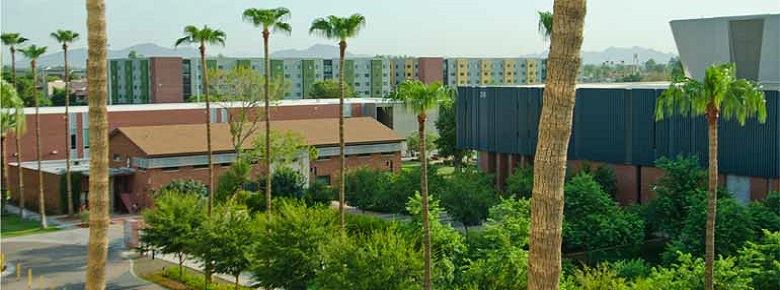
Grand Canyon University offers a Bachelor of Arts in Theology. The program can be completed with an emphasis in Christian Studies, Biblical Studies, Global Ministry, Philosophy, Worship Leadership, or Youth Ministry. Online applicants may submit an admissions form along with their official transcripts. School counselors will contact the applicants after their applications have been submitted.
Grand Canyon University is accredited by the Higher Learning Commission.

Holy Apostles College and Seminary offers a Bachelor of Arts in Theology. Students must complete 120 credit hours with a minimum GPA of 2.0 or higher to graduate. Students may also choose to complete a double major in a field of their choosing. Applicants must apply online with official transcripts and ACT, SAT, or CLEP test scores.
Holy Apostles also offers a 100% online masters in theology for students wishing to pursue further education after earning a bachelors.
Holy Apostles College and Seminary is accredited by the Commission on Institutions of Higher Education of the New England Commission of Higher Education, Inc.
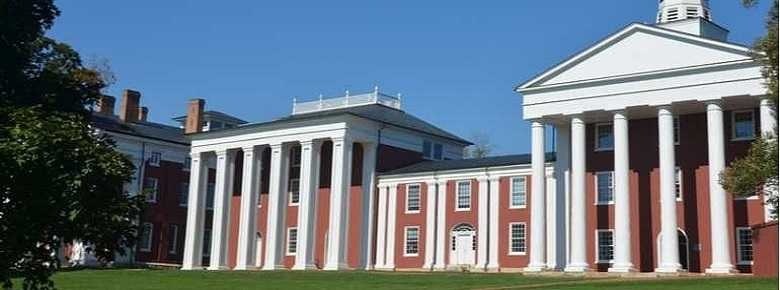
Lee University offers multiple bachelor’s degrees related to theology, including Bible and Theology, Christian Studies, and Ministry Leadership. Each degree program requires students to complete 120 credit hours to graduate. To be eligible for the program, applicants must have 3 years of experience outside of high school and need to submit official postsecondary or high school transcripts.
Lee University is accredited by the Southern Association of Colleges and Schools Commission on Colleges.

Liberty University offers a Bachelor of Science in Religion with an emphasis in Biblical and Theological Studies. Students must complete 120 credit hours to graduate. Each of the online classes is 8 weeks long. Applicants must have a GPA of 2.0 or higher to be eligible for the program.
In addition to a bachelors and masters, Liberty also offers an online PhD in Theology.
Liberty University is accredited by the Southern Association of Colleges and Schools Commission on Colleges.

Loyola University—New Orleans offers an online program for a Bachelor of Arts in Ministry and Theology. To graduate, students must complete 120 credit hours, including 30 credits dedicated to the major. Those interested in the program may apply online through the school’s website with copies of their official high school transcripts or GED certificates.
Loyola University New Orleans is accredited by the Southern Association of Colleges and Schools Commission on Colleges.

Moody Bible Institute offers a Bachelor of Science in Theological Studies. The program offers concentrations in Christian Thought and Spiritual Formation. Students must complete 120 credit hours to graduate. Applicants must submit an official application with two references, an autobiographical essay, SAT or ACT test scores, and high school transcripts.
Moody Bible Institute is accredited by the Higher Learning Commission.

Multnomah University offers an online program for a Bachelor of Arts in Bible and Theology. The program can be completed online, typically in about 4 years. Students must complete 39 credit hours related to the program to graduate. Applicants must submit official transcripts or GED scores and an academic or professional reference.
Multnomah University is accredited by the Northwest Commission on Colleges and Universities.
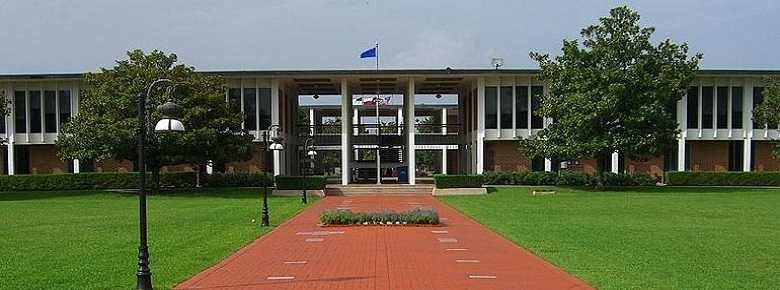
Houston Baptist University offers a Bachelor of Arts in Theological Studies. With biblical and theological fundamentals at the core of the curriculum, the program aims to teach students how historical theological understanding functions in the contemporary world. The program spans 120 credit hours of general education and major-specific courses, and all classes can be completed online.
Houston Baptist University is accredited by the Southern Association of Colleges and Schools Commission on Colleges.
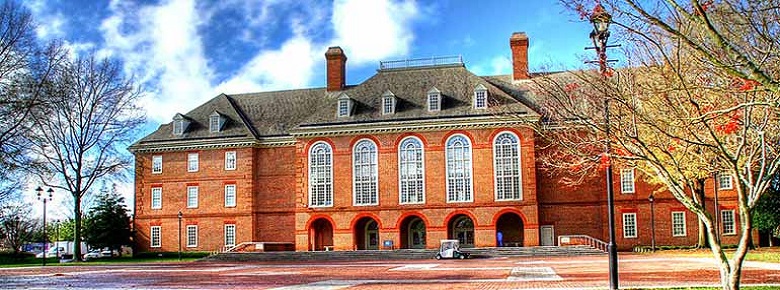
Regent University offers a Bachelor of Arts in Biblical and Theological Studies. The online program requires the completion of 120 credit hours with a minimum GPA of 2.0 to graduate. Applicants may apply through the school’s website by completing an admissions questionnaire. They may submit copies of their unofficial transcripts prior to acceptance into the program.
Regent University is accredited by the Southern Association of Colleges and Schools Commission on Colleges.
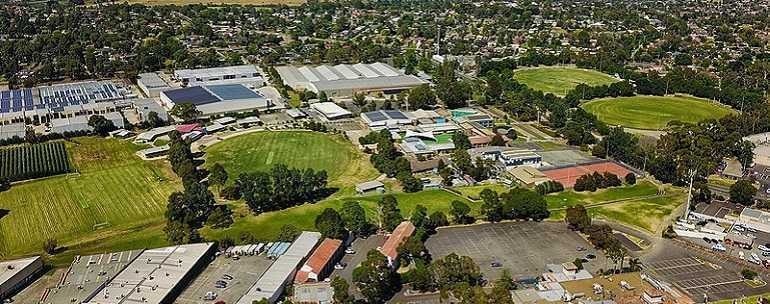
Saint Joseph’s College of Maine offers a Bachelor of Arts in Theological Studies. Students must complete 120 credit hours to graduate. There is a fast track option available that allows students to complete credits for a Master of Arts in Theology or Divinity at the same time. Applicants must submit official transcripts and a letter of recommendation with their application.
Saint Joseph’s College is accredited by the New England Commission on Higher Education, Inc.
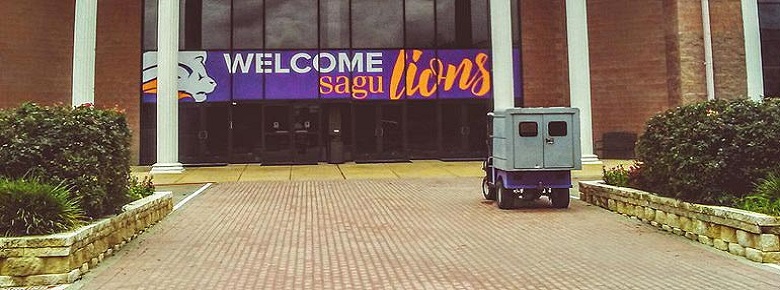
Southwestern Assemblies of God University offers a Bachelor’s in Bible and Theology. The degree can be completed fully online and focuses on scripture and translating biblical Hebrew and Greek. Those interested in the program must submit an online application with official transcripts and placement test scores.
Southwestern Assemblies of God University is accredited by the Southern Association of Colleges and Schools Commission on Colleges.

The University of Northwestern—St. Paul offers a Bachelor of Arts in Biblical and Theological Studies. The online program requires the completion of 125 credit hours to graduate. Those interested in completing a Master of Arts in Theological Studies may enroll in the accelerated degree program to complete 14 credits. Applicants may apply online with their official transcripts.
The University of Northwestern – St. Paul is accredited by the Higher Learning Commission.
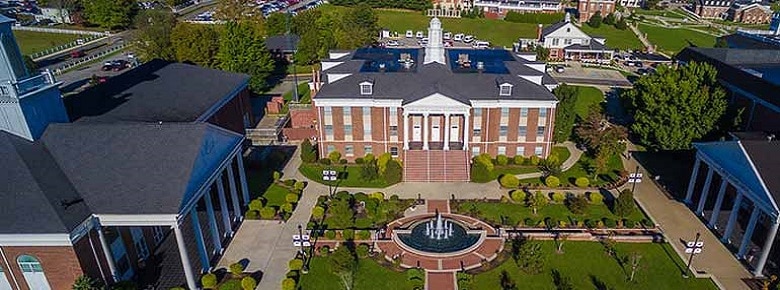
The University of the Cumberlands offers online programs for a Bachelor’s in Missions Ministry and a Bachelor of Theology. Students must complete 120 semester hours to graduate. Those interested in the program may apply online with their official transcripts. To be eligible, applicants must have a high school GPA of 2.0 or higher.
The University of the Cumberlands is accredited by the Southern Association of Colleges and Schools Commission on Colleges.
Getting Your Bachelors in Theology Degree Online

Theology studies can help you become a critical thinker and help you learn more about God as you study sacred writings and church history.
Graduates in this field tend to go on to become ministers, religious educators, writers, nonprofit leaders, and community service workers. If a theology program is in your future, you might think about earning your degree online. Whether you want flexible scheduling or quick-format courses, you may appreciate the benefits that online programs have to offer.
You can take a look at accredited online theology programs at either secular or Christian colleges online to see whether distance learning is right for you. Why not start exploring your programming options today?

